Top KYC Tools for Growth-Stage Companies

Growth-stage companies face mounting challenges with KYC (Know Your Customer) compliance as they expand. Manual processes can’t keep up with high volumes of new users, risking non-compliance, fines, and reputational damage. Automated KYC tools solve this by streamlining identity verification, fraud detection, and regulatory compliance. Here’s a quick summary of the top tools:
For growth-stage leaders, KYC decisions shouldn’t live in a silo. The strongest financial strategy connects compliance tools to broader planning around scalability, risk reduction, and long-term enterprise value — areas where a well-structured fractional CFO approach can make a measurable difference.
Quick Takeaway: Choose a tool based on scalability, compliance coverage, integration ease, and cost structure. Each tool offers unique features, with some excelling in fraud detection, while others focus on sanctions screening or user-friendly APIs. For growth-stage companies, finding the right fit ensures compliance while supporting operational growth.
How to Choose KYC Tools
When selecting KYC tools, it's essential to focus on features that align with your business needs and future growth plans. Here are some key factors to consider:
Scalability is a must. Your chosen tool should handle growing transaction volumes without performance issues. Cloud-based solutions are particularly helpful here, as they can scale resources as your business expands, eliminating the need for hefty upfront investments.
Regulatory compliance coverage is another critical factor. The tool should adhere to current regulations and be adaptable to future changes. If you plan to operate in multiple jurisdictions, look for solutions that support compliance across various regions and automatically update their protocols as laws evolve. This reduces the risk of legal complications.
Integration capabilities are vital for a seamless setup. Modern KYC tools should provide RESTful APIs that easily connect with your existing systems, such as customer relationship management platforms, payment processors, or databases. Pre-built integrations with popular platforms simplify the process, while webhook notifications enable automated workflows to run without delays.
Automation features can significantly improve efficiency and user experience. Advanced tools leverage machine learning to verify documents, identify anomalies, and flag risks automatically. By minimizing manual intervention, you can speed up processes and reduce errors.
Biometric checks are becoming increasingly important in combating identity fraud and account takeovers. Look for tools that support multiple biometric methods, such as facial recognition, fingerprint scanning, and voice verification. Features like liveness detection help ensure the biometric data is genuine and not spoofed.
Real-time monitoring is crucial for ongoing risk management. Beyond the initial onboarding, the system should continuously screen customers against updated sanctions lists, politically exposed persons (PEP) databases, and adverse media sources. Alerts for changes in a customer's risk profile can help you respond quickly to new threats.
Customer onboarding speed can directly impact your conversion rates and overall user satisfaction. A fast, mobile-friendly onboarding process that supports multiple languages and document types will make it easier to serve a diverse customer base.
Data security and privacy are non-negotiable. Given the sensitive nature of KYC information, opt for tools with strong encryption, robust certification standards, and compliance with local privacy laws. Features like detailed audit trails and support for data deletion requests ensure you meet privacy requirements.
Cost structure varies widely among providers. Some charge per verification, while others offer subscription models. When evaluating pricing, consider the total cost of ownership, including setup fees, API usage, storage costs, and any premium features. Balance these costs against the savings from reduced manual work and quicker onboarding.
Vendor support and documentation can make or break your experience. High-quality API documentation, clear code examples, and accessible sandbox environments simplify implementation. Responsive vendor support ensures smoother operations and faster issue resolution.
For businesses navigating the complexities of KYC tools, Phoenix Strategy Group offers tailored guidance to help you find solutions that meet your current needs and support future growth.
1. AU10TIX
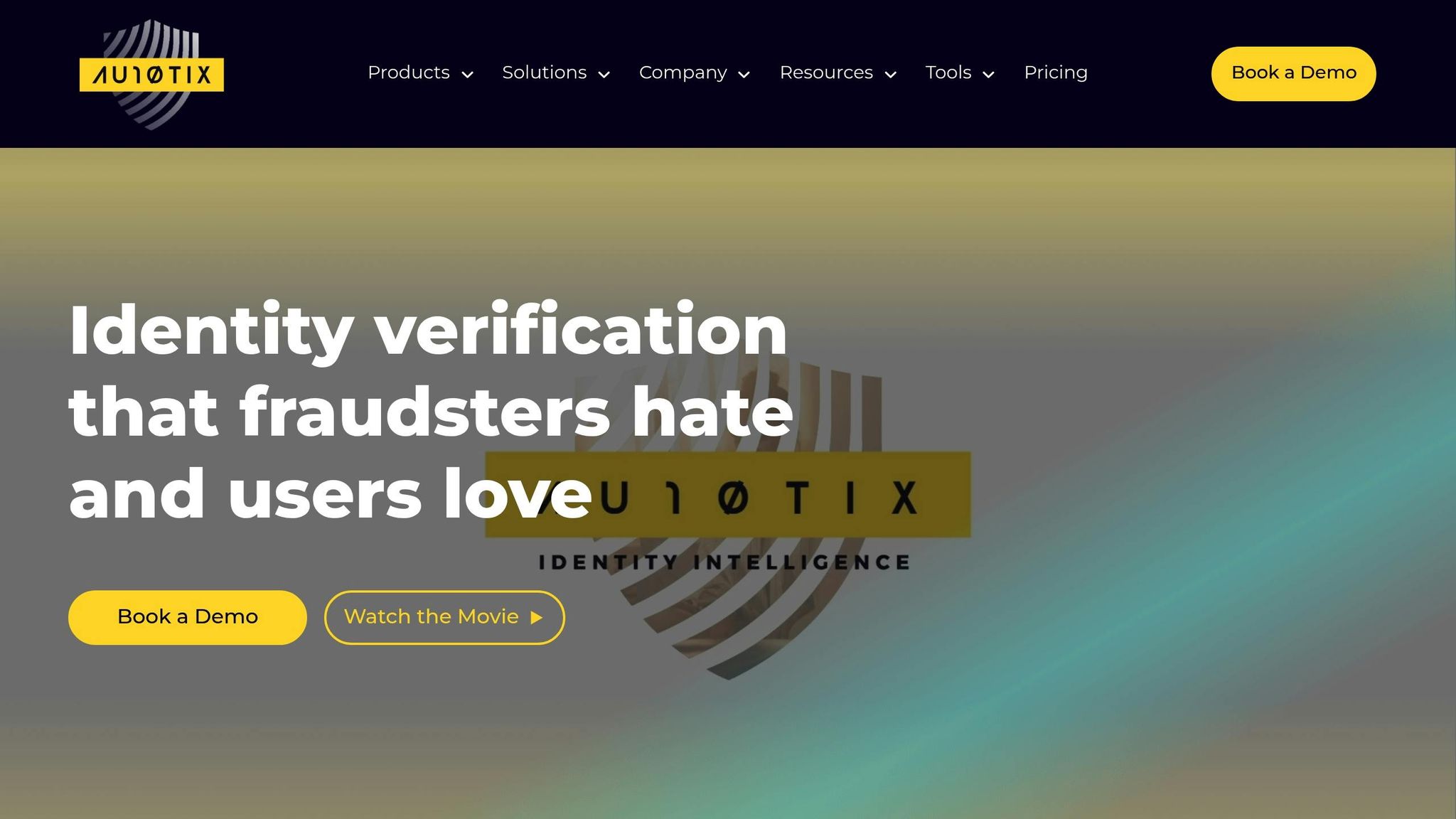
AU10TIX is a robust identity verification solution designed to tackle the challenges faced by growth-stage businesses. By combining document verification, biometric authentication, and AML screening into one platform, it provides a scalable and efficient way to manage identity verification. Here's a closer look at how AU10TIX delivers on its promises.
Built for Scalability
AU10TIX operates on an Azure-based, cloud-native infrastructure, making it capable of handling high transaction volumes. Onboarding and verification can be completed in just 4–8 seconds, ensuring a smooth user experience. With support for documents from over 240 countries and territories, the platform is ideal for businesses aiming to expand globally. Its infrastructure automatically adjusts resources based on demand, delivering consistent performance without the need for hefty upfront investments in infrastructure.
Meeting Regulatory Standards
AU10TIX includes a compliance toolkit that keeps up with changing regulations across various regions. It supports FATF guidelines, the EU Digital Services Act (DSA), and offers customizable workflows to adhere to local regulations. For AML compliance, the platform provides global watchlist checks, PEP screening, and ongoing monitoring to reduce risks. It also ensures data privacy compliance with GDPR, CCPA, and other regulations, while maintaining ISO/IEC 27001:2013 certification for information security.
Seamless Integration Options
The platform offers RESTful APIs and SDKs that integrate easily with existing systems. Developers can take advantage of detailed API documentation and sandbox environments to speed up the integration process. The AU10TIX Business Operating System (BOS) serves as a central hub, allowing businesses to manage verification workflows, track compliance, and access real-time analytics. Pre-built connectors simplify integration with popular tools like CRMs, payment processors, and customer databases.
Automation and Risk Monitoring
AU10TIX streamlines verification processes through automation, handling tasks like document checks, fraud detection, and risk assessment. It also continuously monitors customers against global watchlists and PEP databases, helping businesses stay ahead of potential risks.
2. Sumsub
Sumsub is an identity verification platform tailored for businesses looking to scale efficiently. It combines identity verification, AML screening, and fraud prevention into a single solution, helping companies streamline their compliance operations as they grow.
Built for Growth
Sumsub's cloud-based system handles real-time verification requests, making it a great fit for businesses expanding into international markets. With support for documents from numerous countries, the platform adjusts seamlessly to spikes in traffic - perfect for companies experiencing rapid growth or seasonal surges in demand.
Its flexible pricing model, which charges per verification instead of fixed monthly fees, is especially helpful for businesses navigating fluctuating user activity. This adaptability ensures companies can manage costs while meeting international regulatory standards.
Staying Compliant, Everywhere
Sumsub adheres to key data protection regulations like GDPR, CCPA, and SOC 2 Type II, ensuring sensitive data stays secure. Its AML tools screen against global sanctions lists, PEP databases, and adverse media, updating frequently to stay current with new information.
For businesses operating across multiple regions, Sumsub offers customizable compliance workflows that align with local regulations. This eliminates the need for separate integrations or additional vendors, simplifying operations for companies working in diverse markets.
Easy Integration
Sumsub is designed to integrate smoothly with existing systems. It provides RESTful APIs and SDKs for web, iOS, and Android platforms, along with webhook notifications for real-time updates. This allows businesses to automate workflows based on verification results.
To make setup even easier, Sumsub offers pre-built integrations for platforms like Salesforce, HubSpot, and various payment processors. Dedicated technical support is also available to assist during the integration process, helping businesses get up and running quickly.
Automation and Risk Management
The platform goes beyond initial verification by offering ongoing monitoring and risk assessment. Verified users are continuously checked against updated watchlists, and re-verification processes can be triggered if risk profiles change.
Sumsub also employs machine learning for fraud detection. Businesses can customize risk scoring to automate approvals for low-risk users while flagging higher-risk cases for manual review. This ensures compliance and security as companies expand their customer base.
3. Sanction Scanner
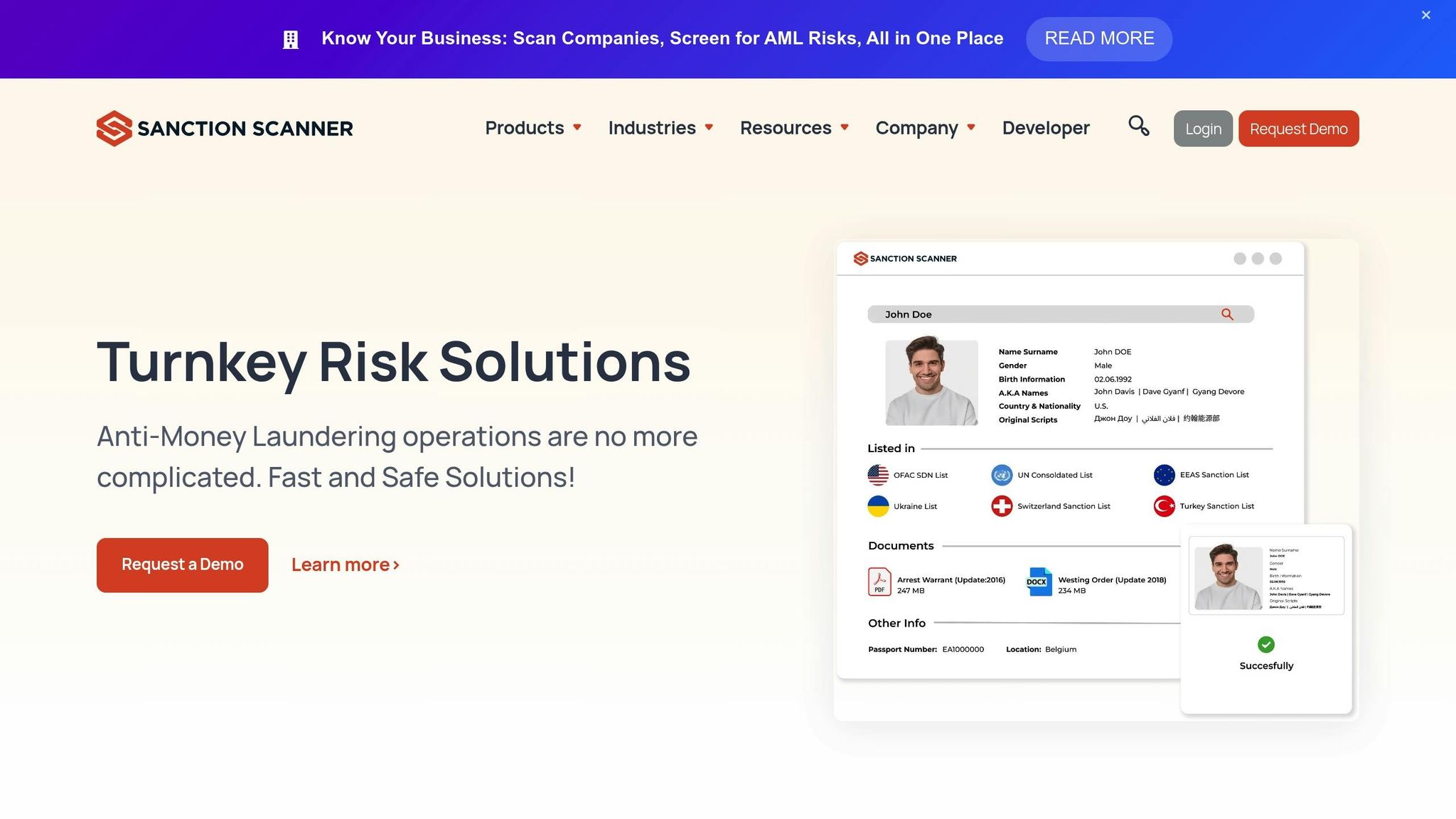
Sanction Scanner plays a key role in KYC strategies by offering tools that ensure strict AML compliance while supporting business growth. Specializing in AML compliance and sanctions screening, it’s an ideal solution for growth-stage companies looking to manage risks effectively while expanding globally.
Regulatory Compliance Coverage (AML, FATF)
Sanction Scanner provides extensive coverage of AML regulations, including real-time screening, access to PEP (Politically Exposed Persons) data, and adverse media checks across more than 200 countries. This makes it easier for businesses to operate confidently in diverse markets with reliable compliance measures.
The platform also adheres to FATF (Financial Action Task Force) standards, which form the backbone of global AML regulations. This includes compliance with the FATF's Travel Rule, a critical requirement for cryptocurrency and fintech companies navigating complex regulatory environments.
By screening global lists like OFAC, UN, and EU, the platform ensures thorough AML checks. Its multi-jurisdictional approach helps businesses meet both local and international AML standards, seamlessly integrating global frameworks with local compliance needs.
Integration Capabilities (API, SDK)
Sanction Scanner offers a powerful RESTful API that allows businesses to integrate its features into existing systems - whether on web or mobile platforms. According to the company:
"You can easily integrate the Sanction Scanner with your project in hours. It supports all the features of our API AML solutions." - Sanction Scanner
The API is designed for two-way data transfer and includes webhooks for real-time updates. It also provides a "Code developer with library" feature, enabling businesses to create custom code in any programming language.
For security, the API uses Simple Basic authentication and supports multiple user roles with varying authorization levels. Developers are further supported with detailed API documentation available through Swagger, ensuring a smooth implementation process.
This robust API framework not only streamlines integration but also facilitates real-time, automated risk monitoring.
Support for Automation and Ongoing Risk Monitoring
The platform's API structure automates compliance workflows based on risk assessments, ensuring that every new customer or transaction is screened instantly. This real-time integration reduces the need for manual intervention.
Sanction Scanner continuously monitors updated sanctions lists and PEP databases, automatically flagging any changes in risk profiles. This is especially critical for growth-stage companies managing a rapidly expanding customer base.
Additionally, its Travel Rule compliance features help automate the intricate requirements of cross-border transactions. By reducing manual oversight, businesses can maintain compliance without compromising efficiency.
4. Jumio

Jumio provides an AI-powered platform for identity verification, combining biometric authentication with advanced technology to deliver secure and seamless solutions tailored for growth-stage companies.
Designed for Growing Businesses
Jumio's cloud-based platform is built to handle real-time, high-volume identity verification needs. It supports a wide range of document types from various countries and territories, making it a global solution. With usage-based pricing, businesses can scale efficiently without the hassle of integrating multiple regional systems. This setup ensures companies can expand operations while maintaining streamlined processes.
Staying Ahead with Compliance
Jumio aligns with global AML and data protection standards by screening high-risk individuals and flagged entities. It emphasizes data privacy, offering features like automatic data deletion and support for data erasure requests. Detailed audit logs simplify regulatory reporting, and the platform includes tools for ongoing risk assessment and monitoring. This ensures businesses can grow quickly while staying compliant with international regulations.
Flexible Integration Options
Jumio’s platform is designed for easy integration, offering APIs and mobile SDKs for seamless deployment. The web SDK enables desktop verifications with real-time webhook updates, while batch processing handles large-scale needs. With detailed documentation, businesses can integrate Jumio’s tools efficiently, ensuring a smooth setup process.
Automation and Risk Monitoring
Jumio leverages AI to detect tampered documents and synthetic identities, automating much of the verification process. It also provides continuous risk monitoring to track changes in user profiles. A built-in case management system helps streamline manual reviews for more complex cases, ensuring suspicious activities are flagged and addressed promptly. This combination of automation and human oversight enhances security and efficiency.
5. ComplyAdvantage
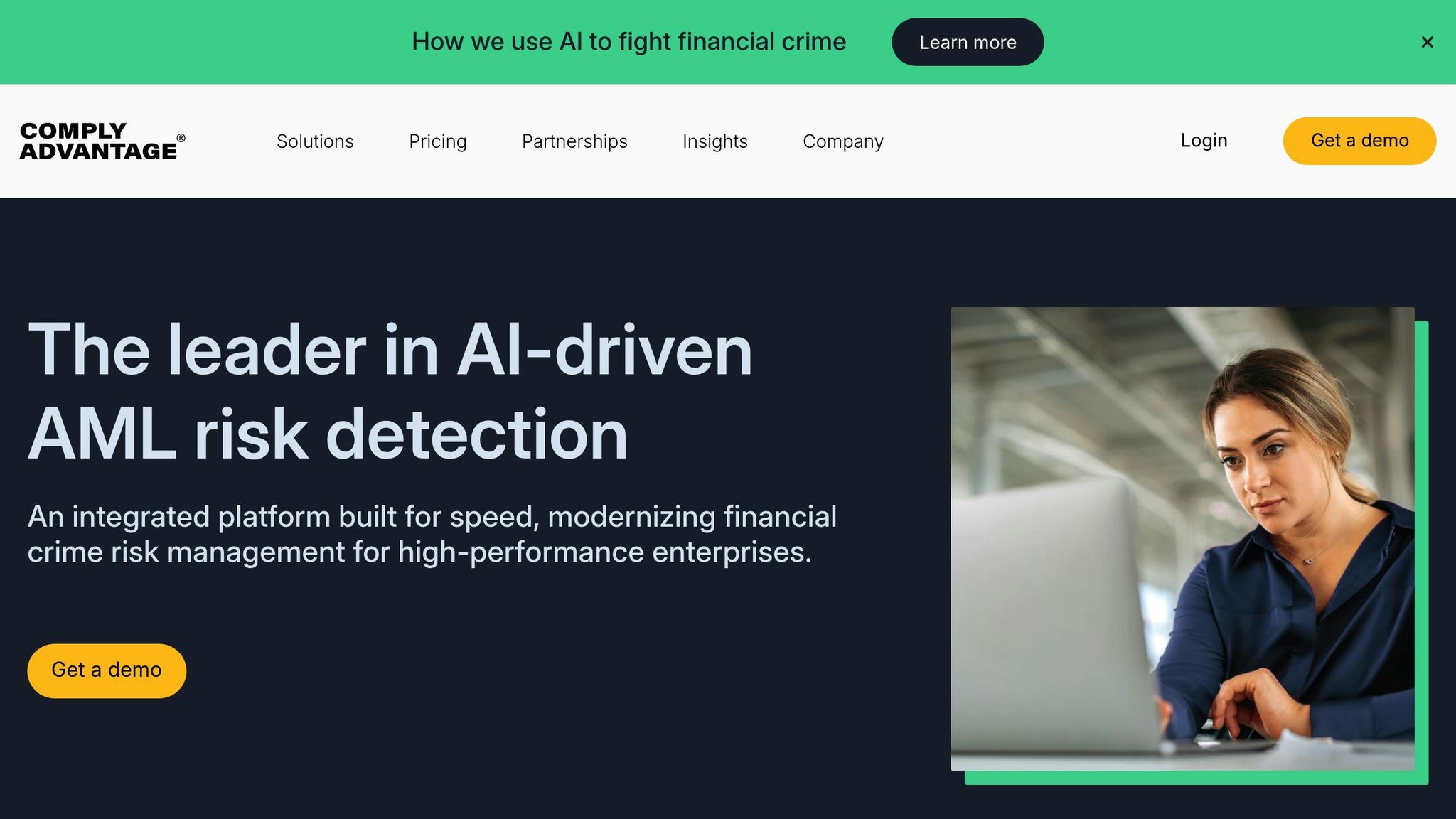
ComplyAdvantage offers a risk intelligence platform designed to help growth-focused companies manage complex compliance requirements with ease. By combining real-time data screening and advanced analytics, it allows businesses to scale their operations effectively without compromising on compliance.
Built for Growing Businesses
The platform’s cloud-native infrastructure is built to handle large-scale operations, processing millions of checks daily across multiple data sources. This makes it ideal for companies experiencing rapid growth and increasing customer bases. With flexible pricing options, businesses can start with basic sanctions screening and expand to advanced risk monitoring as their needs evolve. The system also adjusts automatically during high-demand periods, ensuring fast and reliable performance.
Its modular design is a key feature, allowing companies to activate only the compliance tools they need. For example, a startup might begin with sanctions screening and later add features like adverse media monitoring or politically exposed persons (PEP) checks as regulations become more demanding. This approach avoids unnecessary spending while ensuring compliance solutions grow alongside the business.
Comprehensive Regulatory Coverage
ComplyAdvantage stands out for its extensive regulatory compliance features. It monitors over 200 sanctions lists and regulatory databases, including OFAC, UN, EU, and HMT sanctions. The platform continuously updates its data sources, with some lists refreshed every 15 minutes to reflect the latest changes. This ensures businesses can meet anti-money laundering (AML) requirements across various jurisdictions without juggling multiple compliance systems.
The platform also supports GDPR compliance with automated data retention policies and tools for handling subject access requests. Businesses can configure data deletion schedules to meet legal standards while maintaining audit trails for reporting. Additionally, it aligns with FATF recommendations, offering enhanced due diligence workflows and beneficial ownership screening for deeper risk analysis.
Seamless Integration
To complement its compliance capabilities, ComplyAdvantage provides RESTful APIs with detailed documentation and code samples for popular programming languages. Integration typically takes 2-4 weeks and includes webhook support for real-time notifications. The API can handle both batch processing for large customer databases and real-time screening for individual transactions.
The platform also offers pre-built connectors for widely used systems like Salesforce, HubSpot, and major payment processors. These connectors simplify integration, enabling businesses to embed compliance checks directly into their onboarding workflows. For mobile-first companies, native app integration is supported through mobile SDKs.
Automation and Ongoing Risk Monitoring
By leveraging machine learning, ComplyAdvantage minimizes false positives using historical data and user feedback. The system refines risk scoring over time, improving accuracy and reducing manual intervention. High-risk alerts are routed to compliance teams automatically, while low-risk matches are cleared without additional effort.
The platform also provides continuous monitoring, keeping track of changes in customer risk profiles. Customers are automatically rescreened against updated sanctions lists and adverse media sources, with alerts generated for any new risks. These alerts include detailed context, helping compliance teams respond quickly and effectively. Real-time dashboards offer insights into screening activity, hit rates, and case resolution times, giving teams the tools they need to streamline their compliance operations.
sbb-itb-e766981
6. Entrust
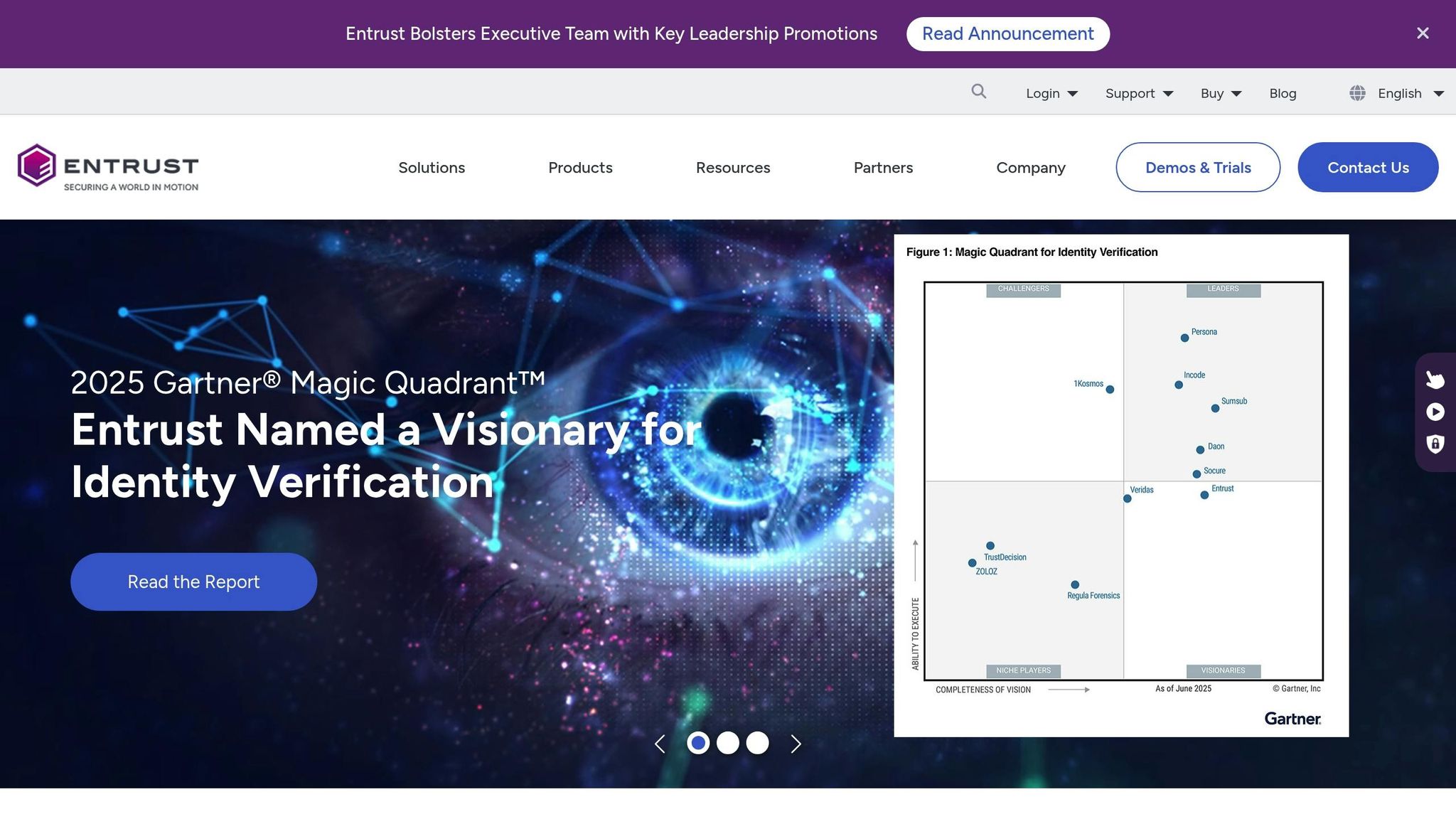
Entrust provides a dynamic identity verification platform designed to secure KYC processes while adapting to your business's growth. By combining advanced authentication services with developer-friendly tools, it allows businesses to implement strong compliance measures without overburdening their technical teams. This flexible system not only strengthens compliance but also evolves to meet future demands.
Built for Growing Businesses
Entrust's open API architecture is designed to grow alongside your business. For companies in their growth phase, this flexibility ensures seamless scalability as operations expand. The platform includes pre-built integrations with major MDM, IAM, and PKI vendors, making it easy to work with both current and new systems.
With pre-configured integrations for most on-premises and cloud applications, Entrust simplifies the implementation process, saving time and resources. Businesses can start with basic identity verification and then gradually adopt more advanced authentication methods as their customer base grows and regulatory needs change. The platform’s developer tools further streamline the integration process, ensuring smooth scalability.
Integration Made Simple
Entrust’s APIs and SDKs allow businesses to embed secure identity solutions directly into their applications, delivering strong security while maintaining a seamless user experience.
The platform also features low-code/no-code orchestration, enabling quick deployment of authentication workflows with minimal coding. This makes it accessible to both developers and non-technical teams. Entrust integrates effortlessly into enterprise and cloud IT environments, including applications, VPNs, networks, and directories. It also supports legacy systems with backward compatibility and offers a library of pre-built connectors and workflow-driven configurations. This ensures businesses can enhance their KYC processes without disrupting existing operations.
7. KYC Portal
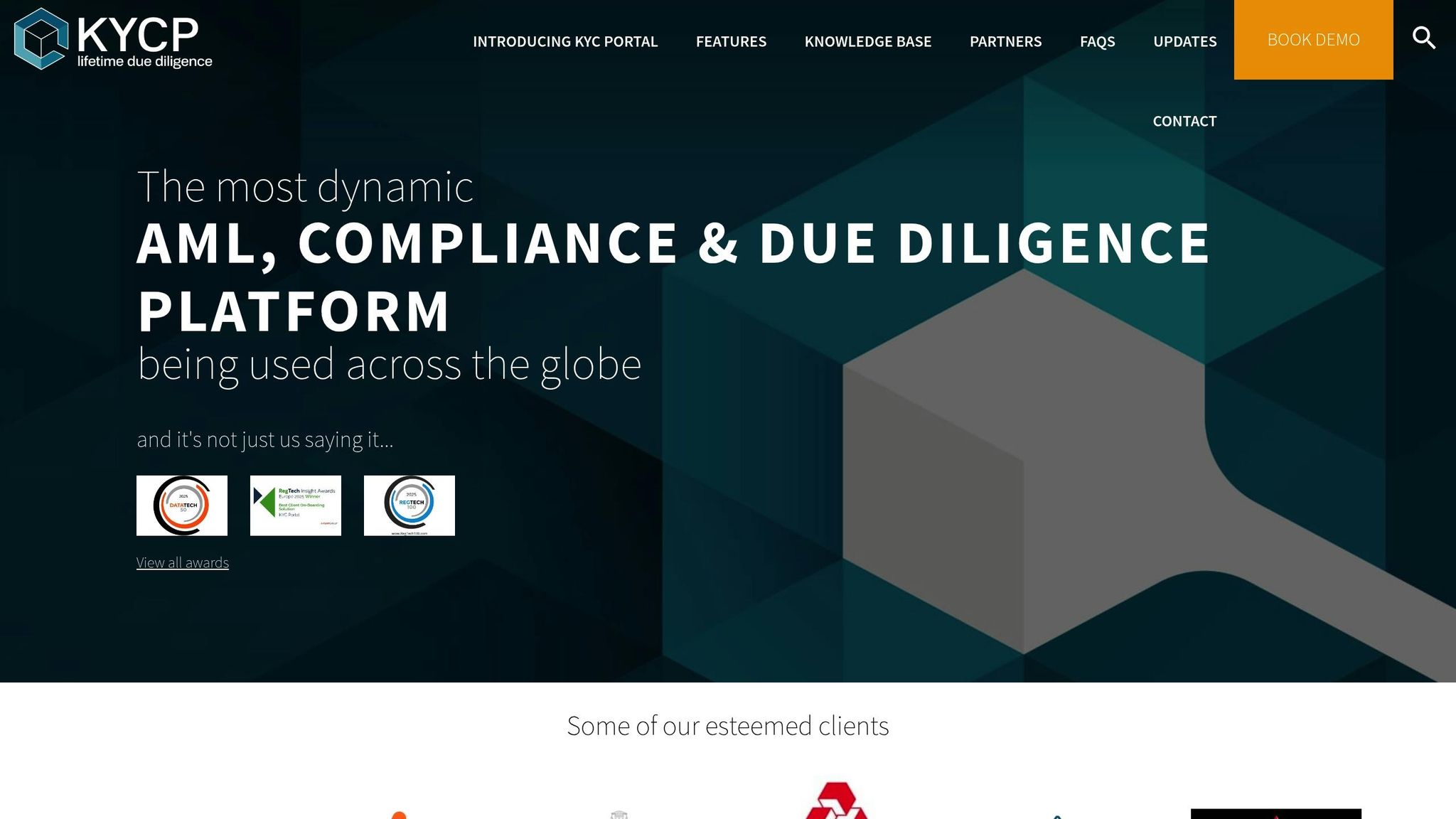
KYC Portal is designed to address the twin challenges of compliance and growth for companies scaling their operations. KYC Portal CLM (Client Lifecycle Management) combines automated onboarding with continuous monitoring, making it an ideal choice for businesses rapidly expanding their client base.
Built for Growing Businesses
KYC Portal CLM prioritizes scalability, helping businesses transition smoothly from startup to enterprise. It simplifies the client lifecycle - covering everything from onboarding to ongoing monitoring - which is crucial as companies handle a growing number of clients.
"Scalability is a key feature of KYC Portal CLM, making it suitable for businesses of all sizes. Whether you're a small startup or a global enterprise, the platform can adjust to meet your needs, ensuring long-term growth and success." - FinTech Global
With automated data collection and due diligence, the platform speeds up onboarding while centralizing client data. This reduces manual work and eliminates inefficiencies that often arise during growth. By keeping all client information in one place, KYC Portal ensures consistent compliance throughout the entire client lifecycle, a critical factor for businesses navigating complex regulatory landscapes.
Staying Ahead on Compliance
KYC Portal's Field-Level Audit Trail feature strengthens internal controls and prepares businesses for audits. This is especially important for companies facing heightened regulatory scrutiny as they expand.
Seamless Integration with Existing Systems
The platform integrates effortlessly with existing CRMs and ERPs through full API integration, making it easy to maintain smooth data flows. This ensures that businesses can expand without disrupting their current workflows. Additionally, the platform offers customizable workflows, allowing companies to tailor the solution to their unique operational needs as they grow.
Automation and Risk Monitoring
KYC Portal automates many compliance tasks, such as sending alerts for document expirations and conducting continuous client risk monitoring. These features help businesses maintain compliance while reducing the workload on compliance teams, ensuring that risks are managed effectively as operations scale.
8. ComplyCube
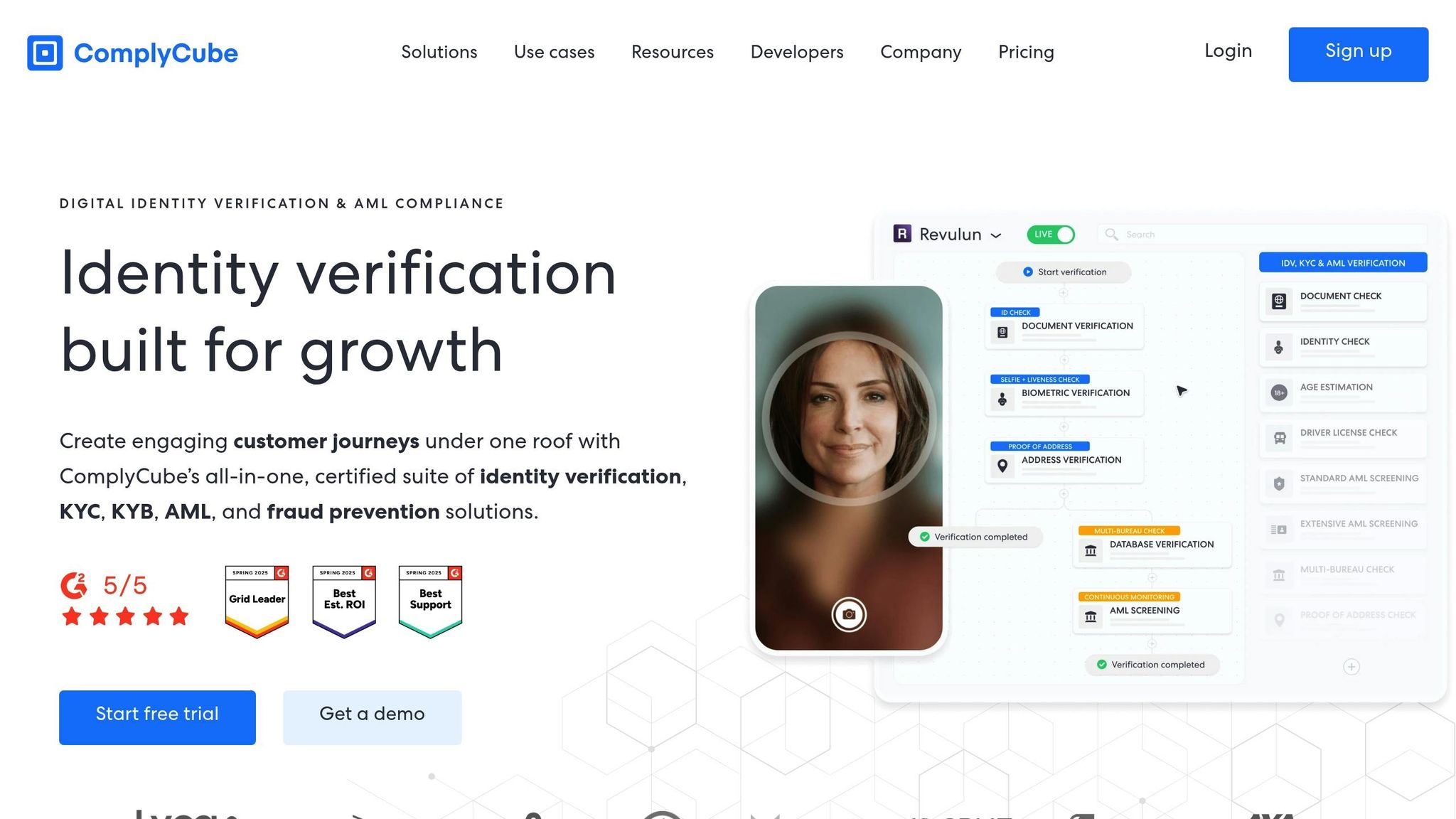
ComplyCube is a powerful KYC platform designed to tackle the intricate compliance demands of growth-stage companies. By offering broad regulatory support, it enables businesses to scale without compromising on strict compliance requirements.
Regulatory Compliance Coverage (AML, GDPR, FATF)
ComplyCube ensures businesses stay compliant with major regulatory frameworks, including AML, GDPR, and FATF. Its anti-money laundering (AML) features are a cornerstone, providing organizations with a solid, risk-based compliance process.
"ComplyCube's platform can power organizations with a strong risk-based AML process." - ComplyCube
Beyond AML, the platform helps businesses adhere to GDPR, ensuring customer data is managed in line with European privacy laws. It also aligns with FATF standards, making it easier for companies to navigate multiple regulatory requirements as they expand internationally. By integrating these compliance measures with advanced automation, ComplyCube simplifies complex processes while maintaining high standards.
Automation and Risk Mitigation
Automation is at the heart of ComplyCube's approach, reducing manual tasks and improving accuracy. The platform streamlines risk management across the entire customer lifecycle, offering tools to save time and cut costs.
"ComplyCube is ideally positioned to provide companies with the tools to facilitate robust, accurate, time-efficient, and cost-effective automated solutions for mitigating customer risk." - ComplyCube
Tool Comparison Chart
This chart provides a side-by-side look at the features, integration options, and compliance coverage offered by various tools, helping you evaluate which one suits your needs best.
Biometric verification, document authentication, real-time fraud detection
API integration, mobile SDK
AML, KYC, GDPR
Custom pricing
Excellent fraud detection, strong biometric tools
Lack of clear pricing details
Multi-layered verification, AML screening, transaction monitoring
RESTful API, webhooks, mobile SDK
AML, KYC, GDPR, PCI DSS
Tiered pricing
Comprehensive features, solid documentation
May be too complex for smaller teams
Real-time sanctions screening, PEP lists, adverse media monitoring
API integration, bulk screening
AML, OFAC, EU sanctions, UN sanctions
Transparent pricing tiers
Excels in sanctions screening, fast processing
Limited identity verification options
AI-powered ID verification, liveness detection, risk scoring
RESTful API, mobile SDK, web integration
AML, KYC, GDPR, CCPA
Custom pricing
Advanced AI tools, global document support
Higher costs for premium features
Risk database, transaction monitoring, case management
API integration, batch processing
AML, sanctions, PEP screening
Enterprise pricing
Strong risk intelligence, powerful analytics
Tailored more for enterprise users
Digital identity verification, certificate-based authentication, secure transactions
API integration, SDK options
AML, KYC, FIDO2, PKI standards
Custom enterprise pricing
High-level security, robust authentication
Implementation can be complex
Streamlined onboarding, document collection, compliance workflows
API integration, white-label options
AML, KYC, regional compliance
Flexible pricing models
Easy-to-use interface, customizable workflows
Lacks advanced fraud detection features
Automated risk assessment, multi-jurisdiction compliance, customer lifecycle management
RESTful API, webhooks, mobile SDK
AML, GDPR, FATF
Transparent pricing tiers
Strong automation, broad compliance coverage
Newer platform still refining features
Understanding the Trade-offs
Each tool offers its own strengths and limitations, making it critical to weigh features, complexity, and cost against your specific needs. For instance, Sanction Scanner specializes in sanctions screening but doesn’t provide comprehensive identity verification. On the other hand, Jumio and AU10TIX deliver cutting-edge tech but come with higher costs and steeper learning curves.
For companies in growth phases, tools with transparent pricing, like ComplyCube and Sanction Scanner, can simplify budgeting and planning. In contrast, enterprise-focused options often require custom pricing negotiations, which can extend timelines.
Integration complexity is another key factor. Platforms like Sumsub and ComplyCube stand out for their developer-friendly APIs and clear documentation, making them easier to implement. Meanwhile, enterprise-grade solutions like Entrust may offer more robust features but require significant technical resources and longer setup times.
When it comes to compliance, most tools meet basic AML and GDPR standards. However, businesses operating in multiple regions should look for platforms with specific support for regional requirements, such as FATF guidelines or local sanctions lists.
Next, we’ll dive deeper into how these factors shape your overall KYC strategy.
Conclusion
A well-implemented KYC system isn't just about checking regulatory boxes - it's a game-changer for growth-stage companies. By choosing the right tools, businesses can streamline compliance, avoid regulatory pitfalls, and set the stage for sustainable growth.
When evaluating KYC tools, focus on three key factors: cost, compliance, and scalability. Pricing can vary widely, from budget-friendly options to enterprise-level solutions requiring significant investment. The goal is to find a tool that fits your current needs while leaving room for future growth.
Another crucial consideration is integration. Many KYC platforms now come with developer-friendly APIs and thorough documentation, making the integration process smoother. However, expert advice can make all the difference in navigating this process effectively.
For U.S.-based companies, it's important to ensure that your chosen tools are adaptable to international compliance standards. This flexibility is essential for businesses with global ambitions.
If you're navigating these decisions, Phoenix Strategy Group offers tailored guidance to help founder-led businesses scale effectively. Their expertise spans from early-stage startups to companies growing past $100 million in revenue. They specialize in integrating advanced KYC solutions that not only meet regulatory demands but also enhance customer onboarding, fuel growth, and support successful exits.
With the right KYC tools and expert support, compliance evolves from a regulatory hurdle into a strategic advantage - unlocking new opportunities and driving market expansion.
FAQs
What should growth-stage companies look for when choosing a KYC tool?
When choosing a KYC tool, growth-stage companies need to focus on compliance readiness - making sure the tool aligns with the regulatory standards in the regions where they operate. This ensures they stay within the law while building trust with customers and partners.
Another critical factor is scalability. As the business grows, the tool should handle increased demands without sacrificing performance or efficiency.
Beyond these, consider tools with strong integration capabilities to ensure they work smoothly with your existing systems. Look for accuracy to reduce errors and avoid unnecessary complications, and prioritize fraud detection to protect your business from potential risks. Lastly, robust data security features and dependable customer support are essential for protecting sensitive information and resolving issues quickly.
How can automated KYC tools help growth-stage companies ensure compliance and improve efficiency when expanding globally?
Automated KYC tools are a game-changer for growth-stage companies aiming to simplify compliance and improve operational efficiency. By speeding up customer identity verification, these tools make the process more accurate and consistent. The result? Fewer manual errors, lower operational costs, and a smoother onboarding experience - essential for businesses dealing with intricate international regulations.
Thanks to AI-powered features, automated KYC systems also strengthen risk assessment and data security. They help businesses stay ahead of regulatory risks and quickly adapt to changing global standards. For companies in their growth phase, this translates to streamlined operations, easier scalability, and a more robust approach to compliance across various markets.
Why is it important for growing companies to choose a scalable KYC solution?
For companies on the rise, having a scalable KYC solution is crucial for handling a growing customer base while staying compliant and secure. As your business grows, a well-designed system streamlines the onboarding process, cuts down on manual tasks with automation, and helps keep operational costs in check.
Scalability also makes it easier to enter new markets and navigate changing regulatory landscapes without being bogged down by outdated or inflexible verification tools. This adaptability is key to maintaining steady growth and preventing slowdowns in customer onboarding or compliance processes.
About Us
Phoenix Strategy Group helps founders realize their dreams by installing a proven finance + RevOps system that turns founder-led companies into scalable businesses and maximizes exit value.
Follow us on LinkedIn.
Related Blog Posts
- Scaling Fintechs with AML/KYC Compliance
- How to Navigate FinTech Regulatory Changes
- Ultimate Guide to RegTech for Cross-Border AML
- 2025 FinTech Compliance Checklist for Startups
{"@context":"https://schema.org","@type":"FAQPage","mainEntity":[{"@type":"Question","name":"What should growth-stage companies look for when choosing a KYC tool?","acceptedAnswer":{"@type":"Answer","text":"<p>When choosing a KYC tool, growth-stage companies need to focus on <strong>compliance readiness</strong> - making sure the tool aligns with the regulatory standards in the regions where they operate. This ensures they stay within the law while building trust with customers and partners.</p> <p>Another critical factor is <strong>scalability</strong>. As the business grows, the tool should handle increased demands without sacrificing performance or efficiency.</p> <p>Beyond these, consider tools with strong <strong>integration capabilities</strong> to ensure they work smoothly with your existing systems. Look for <strong>accuracy</strong> to reduce errors and avoid unnecessary complications, and prioritize <strong>fraud detection</strong> to protect your business from potential risks. Lastly, robust <strong>data security features</strong> and dependable customer support are essential for protecting sensitive information and resolving issues quickly.</p>"}},{"@type":"Question","name":"How can automated KYC tools help growth-stage companies ensure compliance and improve efficiency when expanding globally?","acceptedAnswer":{"@type":"Answer","text":"<p>Automated KYC tools are a game-changer for growth-stage companies aiming to simplify compliance and improve operational efficiency. By speeding up customer identity verification, these tools make the process more accurate and consistent. The result? Fewer manual errors, lower operational costs, and a smoother onboarding experience - essential for businesses dealing with intricate international regulations.</p> <p>Thanks to AI-powered features, automated KYC systems also strengthen risk assessment and data security. They help businesses stay ahead of regulatory risks and quickly adapt to changing global standards. For companies in their growth phase, this translates to streamlined operations, easier scalability, and a more robust approach to compliance across various markets.</p>"}},{"@type":"Question","name":"Why is it important for growing companies to choose a scalable KYC solution?","acceptedAnswer":{"@type":"Answer","text":"<p>For companies on the rise, having a <strong>scalable KYC solution</strong> is crucial for handling a growing customer base while staying compliant and secure. As your business grows, a well-designed system streamlines the onboarding process, cuts down on manual tasks with automation, and helps keep operational costs in check.</p> <p>Scalability also makes it easier to enter new markets and navigate changing regulatory landscapes without being bogged down by outdated or inflexible verification tools. This adaptability is key to maintaining steady growth and preventing slowdowns in customer onboarding or compliance processes.</p>"}}]}




